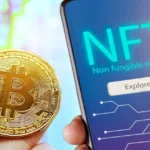Her Majesty’s Revenue and Customs (HMRC) secured its place in history as the world’s first tax authority that seized a non-fungible token (NFT).
The United Kingdom’s financial watchdog seized 3 NFTs in total this week after investigating the potential VAT fraud case worth £1.4 million ($1.9 million) and involving 250 fake companies.
The move marks the first-ever NFT seizure in the United Kingdom, and “serves as a warning to anyone who thinks they can use crypto asses to hide money from HMRC”, authority’s officers told BBC.
According to the report, the UK’s law enforcement arrested three suspects and seized £5,000 (over $6,760) worth of cryptocurrencies together with 3 NFT artworks, whose real value has not been determined yet.
The seized tokenized assets were previously auctioned on Wilsons Auctions, which is the largest independent auction company in the UK and Ireland.
As far as it is known, the UK’s tax authority secured a court order to prevent NFTs and digital currencies from being accessed and sold further.
NFTs Are The New Target
Following the skyrocketing popularity of the NFT market, non-fungible tokens become a commonly used medium for illicit activities around the globe.
Wash trading and money laundering are the main areas of criminal activities that involve NFTs, states blockchain analytics Chainalysis in their recent Crime and NFTs report.
According to it, wash trading already generated nearly $9 million in profits for illicit actors. The tactic allows to artificially inflate the price of NFT by selling it to another wallet, which belongs to the seller.
A similar story recently happened with the NFT collection of Melania Trump, where the former First Lady of the United States bought her own NFTs.
The lack of regulation in the NFT market is among the reasons for NFT usage for illicit activities. “Many NFT trading platforms allow users to trade by simply connecting their wallet to the platform, with no need to identify themselves”, explains Chainalysis experts.
Apart from wash trading, Chainalysis highlights money laundering as another fast-growing form of NFT abuse. As its report says, the value sent to NFT marketplaces by illicit addresses increased almost 3x within the Q3 and Q4 of 2021 compared to the previous quarters. The illicit addresses here refer to scam- and stolen funds-associated digital asset wallets.
Chainalysis sees the risk of the NFT art market becoming an extension of the traditional fine art market, where money laundering has been an issue for years.










